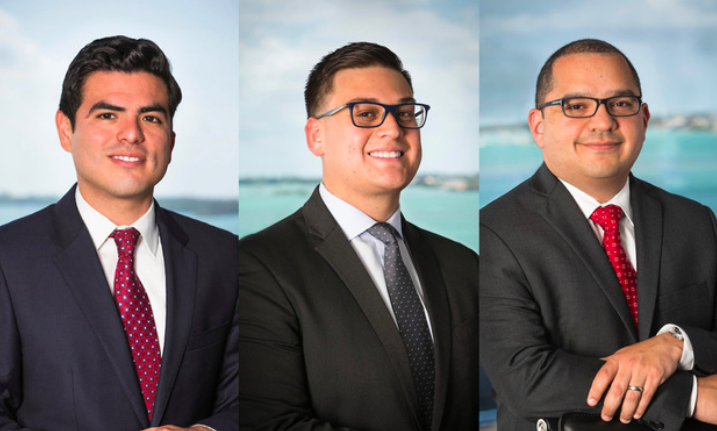The Bankruptcy Episode w/ Paul Orshan, Leyza Florin Blanco, Jacqueline Calderín, and Joe Stone
/0 Comentarios/en News Release /por Jacques HartFelony Miami explores the disparities in the criminal justice system and the intersection of those disparities and the arts.
In this exploration, Felony Miami seeks to educate, entertain, enlighten and contribute towards the improvement and fairness of the system. Felony Miami intends to do this by bringing together thought leaders, decision makers, the accused, the guilty, the not guilty and other participants in the system and in the arts to examine the current state of being, ways in which the system can be improved and ways in which the arts can contribute to this exploration and improvement.
Sequor Law’s Leyza B. Florin spoke with Felony Miami as part of their Bankruptcy Episode. Click below to listen.
Gibraltarian payday loans business files Chapter 15 in Miami
/0 Comentarios/en News Release /por Jacques HartTwo weeks after its UK sister company filed for Chapter 15 protection in New Jersey, the joint liquidators of a Gibraltar-registered payday loans business embroiled in fraud and mismanagement allegations, have sought recognition of their appointment in Miami.
With counsel from Sequor Law shareholder Leyza B. Florin, Grant Thornton partners David Ingram and Frederick White filed the Chapter 15 petition in the US Bankruptcy Court for the Southern District of Florida on 14 August.
Ingram and White were appointed joint liquidators of Privilege Wealth One by the Supreme Court of Gibraltar in June, five months after administrators were appointed over its sister company, UK-registered holding company Privilege Wealth, in England.
Soon after the UK administrators were appointed, the group caught the attention of the UK’s Mail on Sunday, which quoted a letter to investors from Privilege Wealth One blaming the group’s problems on a series of bad decisions, including the UK company;s investment in a payday loans business in South Dakota run by a Native American Sioux Tribe, and serviced – at least initially – from a call centre in Panama.
The head of that call centre, according to the Mail, was a UK national and “well known scam operator” who was reportedly shot in an assassination attempt in Panama last year. He was later arrested at the request of Spanish police, which accused him of running a scam oil venture from a call centre in Marbella targeting British investors.
In a declaration filed at the Miami court, Ingram said Privilege Wealth One was plunged into compulsory liquidation after Chilean creditor Richard Leclerc filed a statutory demand in Gibraltar in March. Leclerc requested payment owed to him by Privilege Wealth One and its general partner Privilege Wealth Management (PWM) under a loan note agreement.
After the companies failed to satisfy the demand they were presumed insolvent under Gibraltarian law and Leclerc made an application to appoint the joint liquidators, supported by three additional investors. Those four creditors have combined unsatisfied debts of US$600,000 in US loan notes and £800,000 (US$1.02 million) in European loan notes.
Ingram told the US court that he has taken steps to gather information on the affairs of Privilege Wealth One and PWM, and to notify all creditors and interested persons of his appointment. But he said that the information available to the joint liquidators so far has not allowed them determine “the precise details of the funds received from creditors” for investment in the Privilege companies, or how the proceeds were used.
The Chapter 15 application “is of critical importance to addressing these issues”, Ingram’s declaration said. “[R]ecogonition under Chapter 15 is essential to the joint liquidators’ worldwide pursuit of assets with which to recover the funds received from creditors”.
Under Gibraltarian insolvency law, no distinction is applied between the assets of an insolvent entity located within Gibraltar and those outside the territory. “The joint liquidators are empowered to seek recovery of all assets and rights, wherever located,” Ingram said, adding they are duty bound to pursue assets and claims of the debtor in the United States.
Other actions
GRR has already reported that the UK administrators Privilege Wealth, filed Chapter 15 recognition proceedings in New Jersey on 2 August. David Rubin & Partners’ Stephen Katz and John Kelmanson of Kelmanson Insolvency Solutions were appointed by the England and Wales High Court back in January, after the company defaulted on funds owed to the Gibraltarian entity.
In a declaration filed in New Jersey, Katz said he had become aware that Privilege Wealth had possible rights and causes of action arising out of a 25,000 strong portfolio of payday loans. He said any outstanding loans and the proceeds from the portfolio may now lie with US company Oliphant Financial, which was allegedly engaged to service the loans after the UK company’s own Panamanian subsidiary stopped servicing them.
Katz and Kelmanson intend to file lawsuits in the US to obtain what funds they can for creditors, and have also asked the New Jersey bankruptcy court’s permission to repatriate any proceeds recovered to the UK.
Privilege Wealth One and Luxemburgish fund Helix Investment Management are described as the UK company’s two primary lenders in its Chapter 15 application. They appear on a list of entities against whom Katz and Kelmanson may seek provisional relief in the US, along with Florida foreign limited partnership Privilege Direct, and numerous Oliphant entities, which are being pursued by Helix in the District Court of the Middle District of Florida.
Helix, which may be owed US$7 million by Privilege Wealth according to the UK’s Mail on Sunday, is seeking damages of US$75,000 plus interest and injunctive relief in those proceedings for the breach of various security arrangements relating to loans it issued to the company.
In Ingram and White’s Chapter 15 petition in Miami, they also list the Oliphant groups and Helix as entities against whom the Gibraltarian company may seek interim relief, as well as the UK company Privilege Wealth.
A hearing to decide Privilege Wealth One’s recognition application will take place before Judge Laurel Isicoff in Florida on 9 September.
Meanwhile, a recognition hearing for Privilege Wealth’s action in New Jersey has been listed for 6 September, with Judge John Sherwood assigned to the case.
In the US Bankruptcy Court for the Southern District of Florida
In re: Privilege Wealth One Limited Partnership
- Judge Laurel Isicoff
Joint Liquidators of Privilege Wealth One
- Grant Thornton
Partners David Ingram in London and Frederick White in Gibraltar Counsel to the joint liquidators of Privilege Wealth One
- Sequor Law
Partners Leyza B. Florin and Edward Davis in Miami
New ‘Substantial Doubt’ Standard for Foreign Judgment Enforcement in Fla.
/0 Comentarios/en News Release /por Jacques HartA recent change to a state law concerning the recognition and enforcement of foreign judgments in Florida may make it easier to avoid payment of valid debts.
By Arnoldo B. Lacayo, Juan J. Mendoza and Andres H. Sandoval

A recent change to a state law concerning the recognition and enforcement of foreign judgments in Florida may make it easier to avoid payment of valid debts. An amendment to the Uniform Out-of-Country Foreign Money- Judgment Recognition Act (the act) adds two further grounds for denial of recognition of foreign country money-judgments, potentially making it harder to recognize and enforce foreign judgments in the Sunshine State, a jurisdiction already viewed domestically and abroad as a debtor’s haven due to its generous exemptions.
On March 19, House Bill No. 623 was signed into law and, per Article III, Section 9 of the Florida Constitution, went into effect on May 9. The bill adds two discretionary grounds to Section 55.605(2), Fla. Stat., to challenge recognition of a foreign money-judgment. Under these additional grounds, a Florida court need not recognize a foreign money-judgment if the judgment was rendered in circumstances that “raise substantial doubt about the integrity of the rendering court” or “the specific proceeding in the foreign court leading to the judgment was not compatible with the requirements of due process of law.” These new grounds apply only to judgments of other countries and not to judgments of other U.S. states, territories or commonwealths.
Enacted in Florida in 1994, the act largely follows the 1962 version of the Uniform Foreign Money-Judgments Recognition Act (the Uniform Act), promulgated by the National Conference of Commissioners on Uniform State Law (the NCCUSL). The act applies to final, conclusive, and enforceable money-judgments of other countries. Generally, such judgments are entitled to recognition under the act; however, there are several mandatory and discretionary grounds set forth in Section 55.605, Fla. Stat., upon which a court may deny recognition.
While the purpose of the act is to “provide a speedy and certain framework for recognition of foreign judgments,” Laager v. Kruger, 702 So. 2d 1362, 1363 (Fla. 3d DCA 1997), in practice, this may not be the case.
At first glance, the new amendment may seem unnecessary as the act already provides avenues to challenge recognition of a foreign judgment if it is “rendered under a system which does not provide impartial tribunals or procedures compatible with the requirements of due process of law,” or if it is “obtained by fraud.” The official comment to the Uniform Act draws a distinction between the new and existing grounds by stating that the focus of these two new grounds is on the integrity and procedure of the specific court that rendered the judgment, rather than on the judicial system of the foreign country.
Nevertheless, one potential concern is that the amendment invites a case-by-case review of foreign judgments, rather than further the “speedy and certain framework” the act intended to establish. This concern is compounded by the uncertainty as to the application of the nebulous “substantial doubt” standard when evaluating the “integrity” of the foreign court. Based on this language, some may argue that a debtor need only present enough evidence to raise substantial doubt in the mind of the trier of fact rather than affirmatively demonstrating fraud. Thusly, at face value, the amendment appears to welcome the enterprising debtor to argue the interpretation and limits of these new provisions in an effort to delay and possibly frustrate the recognition and enforcement of a legitimate foreign judgment.
Though the “substantial doubt” standard appears broad and ambiguous, it should in fact be narrowly interpreted. The NCCUSL explains that the standard is tantamount to “a showing of corruption in the particular case that had an impact on the judgment that was rendered.” At least two courts have followed the NCCUSL’s guidance in this respect. See In re Carmona, No. 16-50155, 2018 WL 889358, at *13 (Bankr. S.D. Tex. Jan. 19, 2018); Savage v. Zelent, 243 N.C. App. 535, 545 (2015). Neither found “substantial doubt” as to the integrity of the foreign court.
In short, the new amendment may leave room for abuse if courts do not adhere to the guidance of the Uniform Act and the interpretation of other courts. If so, the nebulous “substantial doubt” standard should have minimal impact for experienced creditor’s rights and asset recovery lawyers seeking to enforce valid foreign judgments entitled to recognition in Florida.
Sequor Law

SOBRE NOSOTROS
ENLACES RÁPIDOS
DIRECCIÓN
MIAMI
1111 Brickell Avenue
Suite 1250
Miami, Florida 33131
WASHINGTON, D.C.
1200 G Street NW
Suite 340
Washington, D.C. 20005
DATOS DE CONTACTO
Teléfono: (+1) 305-372-8282
Fax: (+1) 305-372-8202
SÍGUENOS EN:
NUESTRA HOJA INFORMATIVA
Regístrese para recibir noticias de la industria y la empresa todos los meses.





Sequor Law es una firma internacional de abogados que representa instituciones financieras, gobiernos soberanos, empresas estatales, empresas públicas y privadas, profesionales de insolvencia y clientes individuales en las áreas de recuperación de activos, fraude financiero, insolvencia y litigios de servicios financieros.